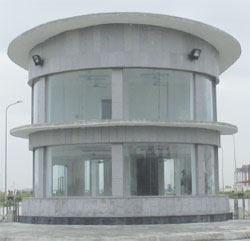Foreign firms playing by the rules
 |
| Kenmark has been mired in debts to Vietnamese banks |
Reports from 30 provinces and cities sent to the ministry and accessed by VIR show most foreign companies investing in Vietnam borrowed funds from mother companies and foreign banks from 2009 to 2011. Those provinces and cities include Dong Nai, Ba Ria-Vung Tau, Bac Ninh, Vinh Phuc and Haiphong, which are among Vietnam’s most attractive destinations for foreign direct investment (FDI).
In Ba Ria-Vung Tau, for example, just 14 foreign-invested enterprises (FIEs) are reported to have borrowed from Vietnamese banks or other financial institutions, out of a total of 277 FIEs operating in this province. In Dong Nai, home to 1,078 FIEs, that number is a paltry seven. There were cases in either Haiphong city or Vinh Phuc province. The largest number was seen in Bac Ninh with 24 of 252 FIEs in the province having taken out loans from Vietnamese banks and financial institutions.
Nguyen Mai, chairman of Vietnam Association of Foreign Invested Enterprises, said the reports from the 30 provinces and cities gave a clear picture of the fund mobilisation of FIEs in the country.
“The result means we don’t have to worry about the fund mobilisation of FIEs within this country. Our target of attracting a huge amount of currency from overseas remains guaranteed,” said Mai.
The review of FIE funding was carried out after the Ministry of Planning and Investment (MPI) made it a requirement late last year. It came in the wake of revelations in the local media about Taiwan’s Kenmark Investment and Development Company which had borrowed $50 million from three local banks in 2008 to develop an industrial park in Hai Duong province but had subsequently faced financial troubles.
Many critics warned foreign investors in Vietnam were sourcing cash within this country, not from overseas and said this could negatively impact on Vietnam’s ailing banking system. Mai, also a former vice chairman of the State Committee of Cooperation and Investment [now known as MPI], said foreign investors mostly borrowed funds from foreign banks outside Vietnam or branches of foreign banks in Vietnam.
This was because these banks had strong financial ability as well as close relationship with foreign companies investing in Vietnam. “Only a small group of FIEs borrowed money from Vietnamese banks. I think it is not a big problem,” he said.
Phan Huu Thang, director of the Centre for Foreign Investment Studies at Hanoi’s Vietnam National University, said the government still needed to control the way in which foreign investors accessed their capital.
He said if foreign investors based in Vietnam mobilised funds here this would make it harder for Vietnam’s enterprises to do likewise, adding this would do little to help fight against the lack of foreign currencies in Vietnam.
But, he added it was not easy to prevent foreign investors from borrowing money from local banks and financial institutions. Thang, also a former director of the MPI’s Foreign Investment Agency, was not sure about the value of having a legal regulation prohibiting foreign investors from borrowing money from domestic creditors.
Meanwhile, Mai said it would be unfair if the government prohibited FIEs from borrowing capital inside Vietnam. He added a regulation on minimum equity, which was under consideration by the government, was a good idea in terms of forcing foreign investors to bring money into Vietnam.
What the stars mean:
★ Poor ★ ★ Promising ★★★ Good ★★★★ Very good ★★★★★ Exceptional
Related Contents
Latest News
More News
- MAE names big 10 policy wins in 2025 (February 06, 2026 | 08:00)
- US firms deepen energy engagement with Vietnam (February 05, 2026 | 17:23)
- Vietnam records solid FDI performance in January (February 05, 2026 | 17:11)
- Site clearance work launched for Dung Quat refinery upgrade (February 04, 2026 | 18:06)
- Masan High-Tech Materials reports profit: a view from Nui Phao mine (February 04, 2026 | 16:13)
- Hermes joins Long Thanh cargo terminal development (February 04, 2026 | 15:59)
- SCG enhances production and distribution in Vietnam (February 04, 2026 | 08:00)
- UNIVACCO strengthens Asia expansion with Vietnam facility (February 03, 2026 | 08:00)
- Cai Mep Ha Port project wins approval with $1.95bn investment (February 02, 2026 | 16:17)
- Repositioning Vietnam in Asia’s manufacturing race (February 02, 2026 | 16:00)

 Tag:
Tag:



















 Mobile Version
Mobile Version